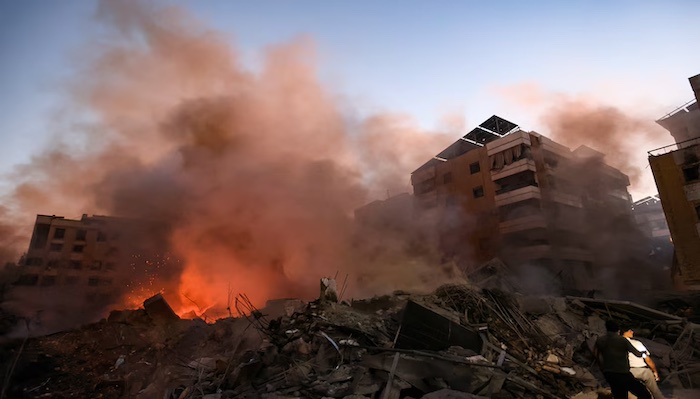Middle East War: Israel strikes Hezbollah intelligence headquarters in Beirut amid escalating conflict with Iran

Israel targeted the intelligence headquarters of Iran-backed Hezbollah in Beirut, as part of ongoing military operations in Lebanon.
On Friday, Israel confirmed it was assessing damage following strikes on senior Hezbollah figures, though Iran’s Supreme Leader has dismissed these actions as ineffective.
The escalation follows Iran’s ballistic missile attack earlier in the week, which came in response to Israeli military actions in Lebanon. Oil prices have surged amidst speculation that Israel may extend its strikes to Iran’s oil facilities, further heightening tensions.
The airstrike in Beirut is part of a wider Israeli campaign that has displaced over 1.2 million Lebanese. The strikes reportedly targeted Hashem Safieddine, the potential successor to Hezbollah leader Sayyed Hassan Nasrallah, who was killed by Israeli forces a week ago. Safieddine’s fate remains unclear, and both Israel and Hezbollah have refrained from commenting on the matter.
Explosions were reported in Beirut’s southern suburbs, including Burj al-Barajneh, Choueifat, and Haret Hreik, as Israel issued evacuation alerts to residents.
Hezbollah also claimed in a statement on Saturday that there were ongoing clashes in the southern Lebanese town of Odaisseh, where the Israeli military allegedly attempted to infiltrate.
U.S. President Joe Biden weighed in on the developments, suggesting that Israel might be considering alternatives to striking Iranian oil fields. Biden clarified that he does not believe Israeli Prime Minister Benjamin Netanyahu’s actions are intended to influence the upcoming U.S. presidential election, in which Republican former President Donald Trump faces Democratic Vice President Kamala Harris. “No administration has done more to help Israel than I have,” Biden stated.
The Lebanese government has condemned Israel’s strikes, claiming over 2,000 people have been killed in the past year, with most deaths occurring in the last two weeks. U.N. spokesperson Stephane Dujarric labelled the civilian toll as “totally unacceptable.” Lebanon has accused Israel of targeting civilians, particularly women and children, while Israel maintains that it only targets military capabilities and accuses Hezbollah and Hamas of using civilians as shields.
The U.S. State Department confirmed the death of Kamel Ahmad Jawad, an American citizen from Dearborn, Michigan, in an Israeli airstrike this week. State Department spokesperson Matthew Miller expressed alarm and reiterated the need for Israel to take “all feasible precautions” to minimise civilian casualties.
This latest surge in violence stems from the October 7, 2023, Hamas attack on Israel, which resulted in the deaths of 1,200 people and saw 250 taken hostage. Israel’s retaliatory strikes on Gaza have killed over 41,000 Palestinians, according to Gaza’s health ministry, and led to widespread displacement, food shortages, and allegations of genocide, which Israel denies.
Meanwhile, tensions between Hezbollah and Israel continue to escalate. On Friday evening, some 70 projectiles were launched from Lebanon into Israeli territory, although many were intercepted or landed in open areas. Israel’s ground operations in Lebanon, which it describes as “localised”, are aimed at enabling the return of citizens displaced by Hezbollah’s bombardments in the northern region. The duration and scope of these operations remain unclear.





